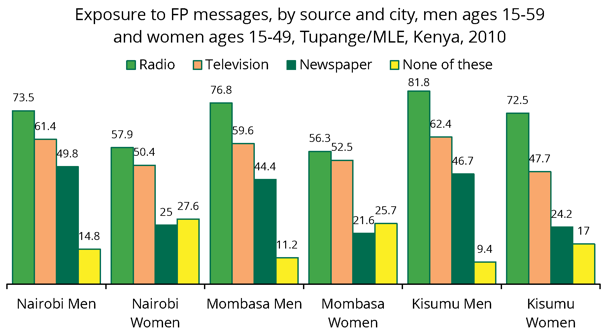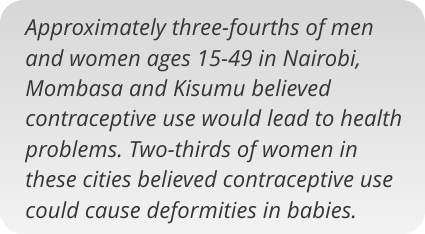Growing up in Jongo, a Nairobi slum, Amani knows what it is like to struggle. The challenges of her daily life have helped her grow into a strong, ambitious young woman who dreams of getting ahead and living a life beyond the slums. Amani has what it takes to create a better life for herself, but when she unexpectedly becomes pregnant, it appears her dream will be deferred indefinitely. Amani lacks essential skills and life experience; just a teen herself, raising a child will present tremendous challenges for Amani. Jongo Love is an educational radio series that tells the story of the lives of Amani and her friends and neighbors in the fictional slum of Jongo, in regular 15-minute installments. Over the course of these episodes, with a lot of hard work, determination and support from friends and loved ones, Amani manages to turn her life around.
Produced by Well Told Story, Jongo Love reaches urban youth in Nairobi, Mombasa and Kisumu. Call-in discussions, listening groups and dialogue on social media outlets such as Facebook supplement each episode. By weaving together engaging and realistic depictions of the lives of urban young people, Jongo Love communicates messages about family planning in a way to which Kenya’s urban young people can relate. At the same time, the series addresses socio-cultural barriers, myths and misconceptions about contraceptives as well as other factors that hinder family planning uptake and continuation.
 Focus on urban youth
Focus on urban youth
Many pressing factors led Tupange (the Kenya Urban Reproductive Health Initiative) to reach out to Kenya’s urban youth through radio and social media. Kenya is experiencing rapid urbanization; people are flocking to cities where infrastructure cannot yet support the ballooning populations. The World Bank reports that while today 30 percent of Kenyans live in urban areas, most of Kenya’s future population growth will occur in cities. Therefore, while the total Kenyan population is expected to double by 2045, the urban population will more than quadruple.
Particularly in slums, the increasingly crowded conditions translate to poor sanitation and health conditions and inadequate access to essential services such as health care and education. More than half of Kenya’s population is now younger than 20 years old. These young people are the future of Kenya; by reaching them with effective family planning messages, Tupange hopes to improve urban health outcomes as well as social, educational, and economic outcomes.
Combatting misinformation
Tupange baseline survey results revealed that misinformation about family planning is very common in all cities. These are just two examples of the many common misconceptions about contraceptives among survey respondents. Jongo Love works to overcome these myths by sharing factual information about family planning during each radio show, and it offers an opportunity for audience members to ask questions and participate in a dialogue about sexuality and reproductive health.
Each episode is followed by a call-in discussion that allows listeners, DJs, and experts to continue the conversation. Discussion questions are also posted on Facebook to generate further interaction and information sharing among peers.
Why radio?
The Tupange baseline survey results showed that far more urban Kenyans were exposed to family planning information by listening to the radio than by watching television or reading newspapers. The baseline data and qualitative data revealed that young people’s preferred source of information on reproductive health and related issues is their peers and other young people with whom they identify. Young people in Kenya connect with peers using social media, including mobile technology, Facebook and YouTube. The content of Jongo Love is written by and tested on young people, making it easy for the target audience to connect with the characters. The radio drama is supplemented with an active Facebook presence and YouTube videos.
Making a difference
Between 2010, when the baseline data was collected, and 2012, modern contraceptive use in the poorest wealth quintile rose nearly 7 percentage points in Nairobi from 36 percent to 43 percent; almost 12 percentage points in Kisumu from 44 percent to 56 percent; and 18 percentage points in Mombasa from 24 percent to 42 percent.
Furthermore, baseline survey data revealed no difference in modern method use between Kenya’s urban rich and poor. By mid-term, however, women in the poorest wealth quintile were more likely to have adopted a modern method compared to women in the richest quintile. In fact, multivariate results show the odds of adopting a modern method among the poorest women were 64 to 71 percent higher than the odds of adopting a modern method among women in the richest quintile.
“The drama empowers people to seek quality information and family planning services from qualified health personnel in health facilities.” – Satisfied consumer of Jongo Love radio drama

Source: “Measurement, Learning & Evaluation of the Urban Reproductive Health Initiative: Kenya, 2013 Mid-term Survey” (March 2013).
Additionally, at baseline, multivariate analysis showed that women ages 15-19 were less likely to use a modern method compared to women older than 40. But by mid-term, findings showed that younger women had almost three times the odds of adopting a modern method compared to women older than 40. The significance of reported exposure to Tupange’s communication activities, including Jongo Love, in the multivariate analyses indicates that these programs are having an effect on their target audience.
This story was originally written by the Measurement, Learning & Evaluation Project, which evaluated the Urban Reproductive Health Initiatives (UHRIs) in Kenya, Senegal, Nigeria and India. The Challenge Initiative is charged with expanding access to the proven solutions and successes developed under the UHRIs.





